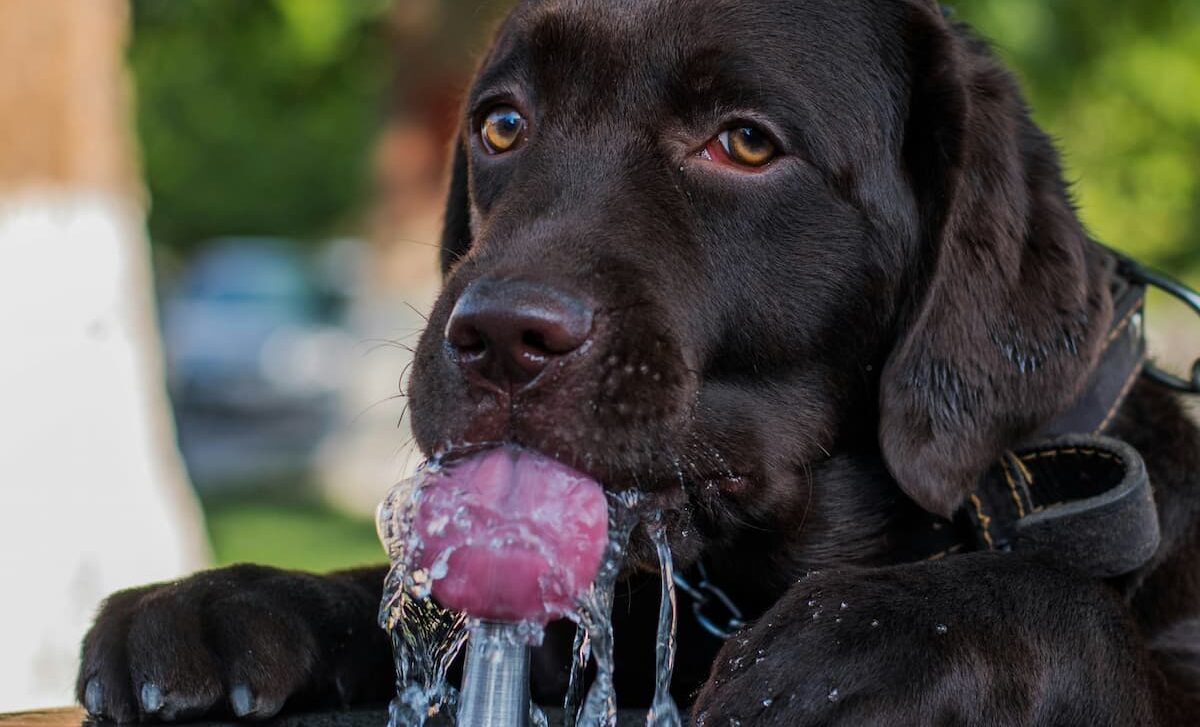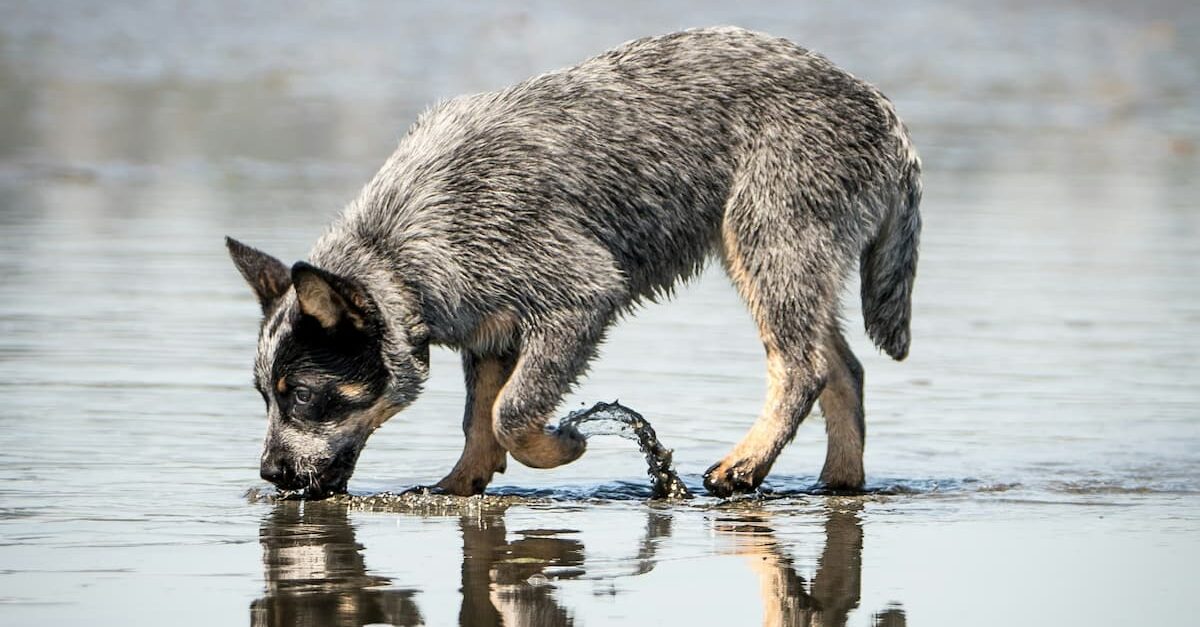Have you ever wondered why our furry friends, those lovable and loyal companions known as dogs, seem to have an aversion to drinking water sometimes?
It’s a peculiar phenomenon that has puzzled countless dog owners throughout the ages.
Picture this: you fill up your pup’s water bowl, eagerly waiting for them to hydrate after their playful antics.
But instead of lapping up the refreshing liquid, they sniff, turn away, and give you a look that says, “No thank you, hooman!”
So, what’s the deal?
Why do dogs sometimes shun the very thing that keeps us all alive?
Read on to have your question answered.
The Role of Natural Instincts in a Dog’s Thirst
Have you ever wondered why your furry friend doesn’t seem to drink water as often as you do?
Well, it’s not that dogs don’t drink water at all, but their natural instincts play a significant role in regulating their thirst.
Let’s take a closer look at why dogs may not always be seen lapping up water like humans do.
1. Natural Adaptations
Unlike humans, dogs have evolved from their wild ancestors who didn’t rely heavily on drinking water as a source of hydration.
In the wild, canines have adapted to obtain moisture from their prey, which contains a significant amount of water.
As a result, dogs have a relatively lower thirst drive compared to us humans.
2. Senses and Instincts
Dogs have a keen sense of smell, and this plays a role in their water consumption.
They can detect impurities or additives in water that may not be appealing to them, making them picky about the water they drink.
Their natural instincts also guide them to find water from various sources, including puddles, streams, or even licking dew off leaves.
3. Environmental factors
Another common reason why dogs may not drink water is due to factors related to their environment.
For instance, if their water bowl is placed near their food, some dogs may avoid drinking water because they perceive it as contaminated.
Similarly, if the water bowl is too close to their potty area, it can also discourage them from drinking.
Ensuring a clean, separate and easily accessible water source for your furry friend can help encourage them to drink more water.
Additionally, changes in their environment or routine can throw your dog off its drinking schedule.
Dogs are creatures of habit, and any disruption to their usual schedule can throw them off.
Moving to a new house, having visitors over, or even changes in their food can all contribute to a dog’s reluctance to drink water.
4. Dietary factors
The type of diet your dog consumes can also influence their water intake.
Dogs fed with wet food or a raw diet may have a higher moisture content in their meals, reducing their need for additional water.
Additionally, certain medical conditions, medications, or activity levels can increase or decrease a dog’s thirst.
Understanding Health Issues That Can Affect a Dog’s Water Intake
Just like humans, dogs can experience a loss of appetite or thirst when they aren’t feeling well.
It’s essential to identify and address these health issues promptly to keep your four-legged companion healthy and happy.
One possible reason for a dog’s decreased water intake could be a urinary tract infection (UTI).
Just like humans, dogs can develop UTIs which can make them feel uncomfortable and lead to a decrease in their desire to drink water.
Other symptoms of a UTI may include frequent urination, blood in the urine, and even accidents in the house.
If you suspect your pup is suffering from a UTI, it’s crucial to seek veterinary care to get the proper diagnosis and treatment.
Another common issue that affects a dog’s water intake is dental problems.
Imagine trying to drink when you have a toothache – not very pleasant, right?
The same goes for our canine companions.
They may experience pain or discomfort when drinking if they have dental issues such as gum disease or tooth decay.
So, if you notice your dog avoiding the water bowl or showing signs of pain when eating, it’s a good idea to schedule a visit to the vet to have their teeth examined.
Other diseases that can potentially cause your pooch to lose its thirst include diabetes and kidney disease.
Tips to Encourage and Ensure Sufficient Hydration in Dogs
If your dog is refusing to drink its water, don’t fret?
Here are some helpful tips to encourage and ensure sufficient hydration in your pup:
1. Make Water Easily Accessible
Just like humans, dogs prefer fresh and clean water.
Ensure that your dog always has access to water by placing multiple bowls in different areas of your home.
This is particularly important if you have a multi-story house or a large yard.
Make sure to change the water at least once a day to keep it fresh and appealing.
Additionally, you can consider investing in a pet water fountain, which provides a continuous stream of filtered water and can be quite enticing for your pup.
2. Enhance the Flavor
Sometimes, dogs can become bored with plain water.
If you notice that your furry friend isn’t drinking enough water, you can try adding a small amount of low-sodium chicken or beef broth to their water bowl.
This can add a touch of flavor that may encourage them to stay hydrated.
However, it’s important to note that you should consult your veterinarian before introducing any additives to your dog’s water, especially if they have any underlying health conditions.
3. Pay Attention to Feeding Routines
Believe it or not, a dog’s diet can impact their water intake.
If your pup primarily consumes dry kibble, it’s essential to ensure they have access to ample water throughout the day.
Dry food can cause dogs to feel thirsty, leading them to drink more water.
On the other hand, wet or canned dog food contains a higher moisture content, reducing the need for excessive water intake.
Therefore, it’s crucial to adjust your dog’s water availability according to their diet to maintain proper hydration.
By implementing these tips, you can help encourage your dog to drink sufficient water and ensure they stay hydrated.
Remember, every dog is different, so it may take some trial and error to find the best approach for your furry companion.
If you’re concerned about your dog’s hydration levels or notice any sudden changes in their water intake, it’s always wise to consult with your veterinarian for further guidance.
When to Seek Veterinary Advice on a Dog’s Drinking Habits
Ensuring our furry friends stay hydrated is essential for their overall well-being.
Just like humans, dogs need a constant supply of water to maintain optimal health.
However, in some cases, you might notice that your canine companion is not drinking water as much as usual or, surprisingly, not drinking at all.
While it might be tempting to brush it off as nothing serious, changes in drinking habits can actually indicate underlying health issues.
Here’s when it’s important to seek veterinary advice on your dog’s drinking habits:
1. Sudden Decrease in Water Intake
If you notice that your dog is drinking significantly less water than usual without any apparent reason, it could be a sign of an underlying health problem.
Dehydration in dogs can be caused by various factors, including kidney issues, infections, or even certain medications.
Consult your vet if you observe your furry friend’s water intake dwindling for no apparent reason.
2. Excessive Thirst
On the other end of the spectrum, if your dog suddenly starts drinking more water than usual, it’s important not to ignore this change in behavior.
Polydipsia, the medical term for excessive thirst, can indicate a potential problem such as diabetes, Cushing’s disease, or kidney dysfunction.
Keep a close eye on your pooch’s water intake and consult your vet if you notice a sudden surge in their drinking habits.
3. Changes in Drinking Patterns
Dogs are creatures of habit, and any sudden changes in their daily routines can raise concerns.
If your dog used to drink water at specific times of the day or had consistent drinking patterns and that suddenly changes, it’s worth seeking veterinary advice.
This could be an indication of an underlying medical issue or discomfort that your furry friend might be experiencing.
Remember, early detection can often lead to better treatment and improved outcomes for your beloved pet.
FAQ
Q: Why do dogs not drink water?
A: Ah, the wonderfully curious nature of our furry friends.
Have you ever wondered why dogs don’t always guzzle down water like we do?
Well, let’s uncover this intriguing mystery together!
Q: Do dogs actually drink less water?
A: It might seem that way, but worry not, dogs definitely drink water.
However, their drinking habits can be quite different from ours, which can sometimes leave us scratching our heads in confusion.
Q: What factors affect a dog’s water intake?
A: Just like us, several factors can influence a dog’s water intake.
Their size, age, activity level, health, and even the weather can all play a role in how much water they drink.
So, it’s not a one-size-fits-all kind of situation.
Q: Is it normal for dogs to drink less water?
A: It’s important to note that dogs typically drink less water compared to humans because their bodies are different.
Dogs have evolved from their ancestors, who were skilled at conserving water in the wild.
So, their bodies are quite efficient at retaining moisture.
Q: How do dogs stay hydrated then?
A: Dogs have a clever way of maintaining hydration even when they drink less water.
They actually get a significant portion of their daily water intake from the food they eat.
Believe it or not, wet dog food can contain up to 70-80% water!
Truly nature’s little hydration trick.
Q: Can certain foods affect a dog’s water intake?
A: Absolutely!
Some dog foods are designed to have a higher moisture content, which can help keep your four-legged buddy hydrated.
So, if you notice your dog isn’t guzzling water like there’s no tomorrow, their food might already have some of that liquid goodness packed in it.
Q: Are there any health concerns if a dog doesn’t drink enough water?
A: While dogs have their own unique ways of staying hydrated, it’s still important to keep an eye on their water intake.
If your pup consistently drinks too little water or shows signs of dehydration (e.g., dry gums, lethargy), it could be cause for concern.
In such cases, consulting a veterinarian is always a good idea.
Q: Is there anything I can do to encourage my dog to drink more water?
A: Definitely!
If you’re worried about your dog’s hydration, there are a few simple tricks you can try.
Make sure fresh water is always available, try using a clean water bowl, or even add some water to their kibble if they enjoy the extra moisture.
Remember, every dog is unique, so it might take some experimentation to find what works best for your furry friend.
Q: Is it ever normal for a dog to completely avoid water?
A: While rare, some dogs may develop a dislike or fear of drinking water due to past experiences or certain medical conditions.
If you notice your dog avoids drinking water altogether, it’s essential to consult a veterinarian to rule out any underlying issues that may need to be addressed.
Closing Summary
As it turns out, dogs do drink water, just not with the same enthusiasm as humans.
Their unique anatomy and instinctual behaviors dictate their drinking habits.
So the next time you see your furry friend sipping water casually or even lapping up water from the toilet (yuck!), remember that it’s all part of their natural routine.
Dogs have been evolving alongside us for thousands of years, and perhaps their quirky drinking habits are yet another proof of their remarkable adaptation.














